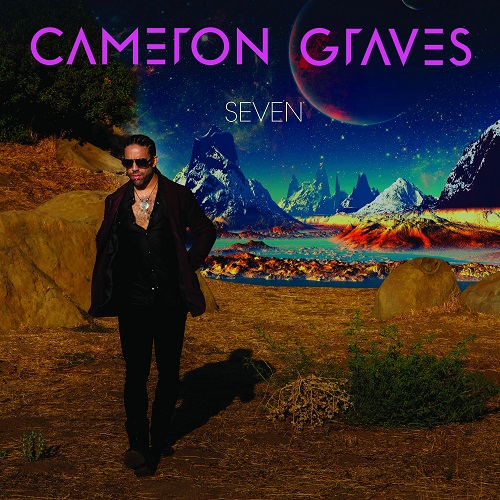(2021) Cameron Graves - Seven
Review:
Pianist, composer, and vocalist Cameron Graves dazzled listeners with his bracing, kaleidoscopic, approach on 2017’s glorious Planetary Prince. He offered an 80-minute journey through post-bop, fusion, modal, and contemporary jazz, hip-hop, and even rock. After studio and touring stints with Stanley Clarke and Kamasi Washington, as well as his own band, Graves returns with a conception he calls “thrash jazz” on Seven. While virtually all of his identifying musical (and philosophical) hallmarks are present — he uses only an acoustic piano — his long-held obsessions with jazz-rock fusion and progressive metal hold sway. These 11 original compositions have been boiled down to essences by his quartet, totaling a mere 34 minutes. The game here is urgency. “Sacred Spheres” weds slamming, uptempo rock drums to a knotty vamp that bridges Return to Forever’s Hymn of the Seventh Galaxy, Frank Zappa’s Waka/Jawaka, and Weather Report’s Mysterious Traveller. Mike Mitchell’s triple-time drumming and Graves’ angular, interlocking grooves are appended by guitarist Colin Cook’s spiky, spiraling lines, as bassist Max Gerl stridently carries the pulse toward a crescendo. Kamasi Washington joins the quartet on “Paradise Trinity.” Graves references Vince Guaraldi’s “Linus and Lucy” liberally and directly in the intro and outro as his band follows in precise tandem. Washington underscores the progression, then cuts loose with a soaring spiritual solo. His other guest spot occurs on the title track, where he and Graves dialogue with sweeping soul and sensitivity, punctuated by Cook’s ringing guitar lines. “Sons of Creation” finds the pianist and guitarist working aggressively above crashing blastbeats, syncopated toms, and a low-tuned rumbling bass line. Graves asserts the vamp forcefully for Gerl, who embraces it. Cook responds with a labyrinthine solo before the band reengages. Graves lays down flamenco patterns on the piano in closing. “Super Universes” is technical death metal played by a jazz quartet. The clash between Graves’ instrument and Mitchell’s ultra-fast breakbeats revolve around detailed, knotty guitar and bass riffing. “Mansion Worlds” most accurately reflects the influence of technical death metal (and in particular Swedish band Meshuggah) on Graves. He tethers razored jazz fusion to Spanish classical feints and fills anchored in knotty thrash as the band travels to unknown worlds. Closer “Eternal Paradise” is a vocal track. As Graves sings, the band offers relentlessly speedy support, while its refrain offers a sly nod to Ronnie James Dio’s tenure with Rainbow. Seven goes by in a blur. It is at once an exhaustive, always captivating guide to Graves’ vast musical imagination. But it’s also an exhausting one, given the relentless physicality and driving pace. Stylistically, Seven may provide a challenge (at least initially) to more traditionally minded jazz fans. That said, it should delight any music fan drawn to adventure, precision, and restless creativity.

Tracklist:
01 - Sacred Spheres
02 - Paradise Trinity
03 - Sons of Creation
04 - Seven
05 - The Life Carriers
06 - Super Universes
07 - Red
08 - Fairytales
09 - Master Spirits
10 - Mansion Worlds
11 - Eternal Paradise
Media Report:
Genre: jazz, prog-rock
Format: FLAC
Format/Info: Free Lossless Audio Codec, 16-bit PCM
Bit rate mode: Variable
Channel(s): 2 channels
Sampling rate: 44.1 KHz
Bit depth: 16 bits
